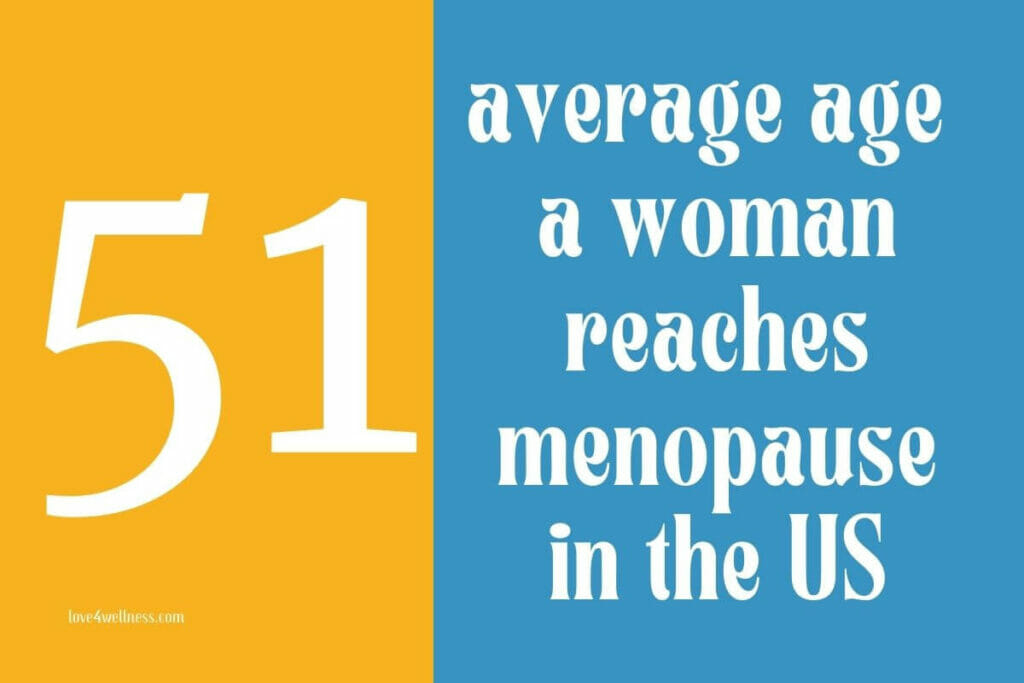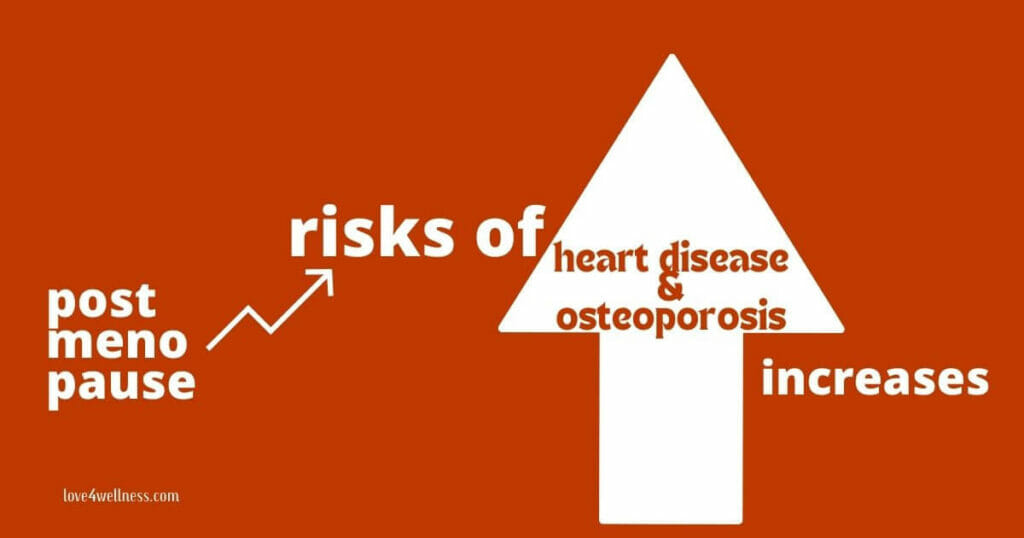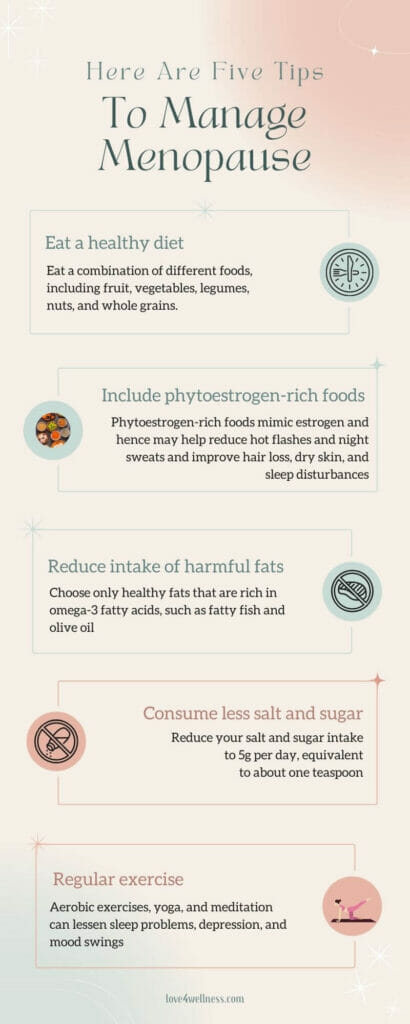At a glance: This article explains what menopause is, the symptoms one may experience, why such symptoms happen, and some tips to manage.
Listen:
You may think ‘no periods anymore’ should be a welcoming thing because there will be no painful cramps and no worries about getting pregnant. Yet, menopause is stared with caution.
Why?
Menopause may be a breezy affair for some with no symptoms. But for some women, it can be turbulent, creating quite a few difficulties.
Like menstruation, menopause is also a hush-hush matter, and statistics show that most women are not aware of menopause, the symptoms one may have, and ways to manage the symptoms.
If you are a woman in your early 40s, read on to understand menopause and some useful tips to strode through the phase with ease.
Three stages of menopause
Perimenopause, menopause, and postmenopause are the three stages of menopause.
A woman may start experiencing menopausal symptoms between 40 to 55 years. This transition phase before you reach menopause is called perimenopause.
When a woman stops getting her periods for more than 12 months, she is said to have reached menopause. You may reach menopause in your 40s or 50s. In the US, 51 years is the average age of menopause.
The years after menopause is called postmenopause.
During the menopause transition, also called perimenopause, the female reproductive hormones estrogen and progesterone start falling rapidly, and this is when you start experiencing various symptoms.
About 8 in 10 women will have one or more menopause symptoms. In some women, symptoms are both difficult and frequent during perimenopause. Once you reach menopause, the symptoms gradually cease.
However, post-menopause, your risks of heart disease and osteoporosis rise, and hence you should be vigilant and take proper care.
Symptoms of menopause and tips to manage
Estrogen and progesterone are the two female hormones that prepare your uterus to menstruate every month.
While progesterone starts falling in your late 20s and significantly after your 30s, estrogen takes a nosedive as you approach menopause.
The low levels of estrogen and progesterone result in various symptoms. They are:
1. Irregular periods
One of the first signs of menopause, your periods get irregular and may happen very close together, lasting more than a week. However, the irregularity does not mean it has to be frequent. For some, the periods may occur once in a few months. You may also have heavy bleeding and spotting in between periods.
2. Hot flashes
Hot flashes are one of the most common symptoms in women nearing menopause. You feel hot in the upper part or whole body, making you sweat, followed by cold shivers. The hot flashes may last for a few seconds or up to 10 minutes.
Further, the number of times they occur also varies among women. While in some, it can be once or twice a week, in others, it can happen several times a day and can be very uncomfortable. Carrying a handheld fan can be extremely helpful in managing hot flashes.
3. Night sweats
Hot flashes occurring at night are called night sweats. Sometimes, they may be so strong that you wake from your sleep.
4. Vaginal dryness
Another common menopause symptom, vaginal dryness, can make sex painful and less enjoyable, and many women would want to know some useful tips to manage the problem. Using vaginal moisturisers will hugely help in reducing dryness.
5. Recurrent UTI
Low estrogen hurts your gut microbiome, thus decreasing the good bacteria. This, coupled with vaginal changes, increase your risk of UTI infections. Vaginal hygiene post sexual intercourse, wiping front to back, hydrating well, and taking showers instead of baths are a few natural ways to prevent UTI infections.
6. Hair thinning
The receding hairline may occur in 20-60% of women approaching menopause. A nutritional diet rich in phytoestrogens, regular exercise, adequate hydration, and remaining stress-free are some tips to keep your locks healthy and intact!
7. Dry skin
Another side effect of plummeting hormones is dry skin. Your skin loses some of its ability to hold moisture and becomes thin and flaky. Having a good skincare routine, vitamin-rich diet, and hydration can help manage dry skin.
8. Lack of sex drive
Low sex drive coupled with a dry vagina will make sex unappealing. Talking with your partner and focusing on intimacy, vaginal lubricants, Kegel exercises, and hormone therapy are some of the ways to treat your libido changes.
9. Weight gain
Your muscle cells may become fat cells, and you may gain weight quickly. Your waistline may also significantly increase. Avoiding processed foods, following a healthy diet rich in complex carbs, healthy fats, calcium, iron, vitamins, and phytoestrogens, and a regular exercise plan are simple and effective ways to maintain a healthy weight.
10. Joint aches and stiffness
Another effect of plunging estrogen is inflammation of joints and weak bones. Your risk of osteoporosis and osteoarthritis rises during perimenopause. Hence, taking a diet adequate in calcium and vitamin D is important for healthy bones and pain-free mobility.
11. Sleep problems
Low estrogen levels can disturb your sleep cycle, reduce REM sleep, and increase the time you take to go to sleep, hence can significantly reduce your sleep quality. Further, night sweats and hot flashes can wake you from sleep.
Going to bed at a set time, keeping your bedroom cosy, listening to relaxing music, and meditation before bedtime can improve your sleep.
12. Changes in mood
During perimenopause, several changes happen, including weight gain, low sex libido, and sleep disruption, which can all affect your mental health and result in frequent mood swings. Aerobic exercises and nutritional food will hugely help in reducing mood changes.
13. Depression
For some women, the hormonal dip can trigger depressive episodes as well. Connecting with peers going through a similar phase hugely helps. Also, communicate your problems with your family and friends. Having a support group improves your confidence in coping with depression.
Bottom line
Menopause can affect every woman differently. Knowing about the symptoms will not only let you be prepared for what to expect but also would empower you to learn how to manage them.
A nutritional diet, regular exercise, adequate hydration, avoiding trigger foods such as spicy foods and alcoholic beverages, quitting smoking, and maintaining a healthy weight are some useful tips that go a long way in managing menopause symptoms.
Treating the symptoms is completely personal and the woman’s choice. When you cannot cope with the symptoms, talking to your doctor is the best thing to do.
This is yet another phase that too shall pass!
Images: canva.com



